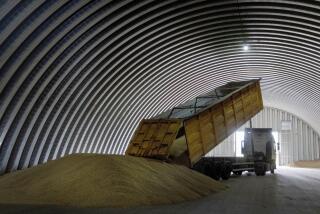Common Mart Bans East Bloc Foods
- Share via
BRUSSELS — The European Economic Community on Saturday ordered a ban on all fresh food imports from the Soviet Union and six East European countries until May 31 because of fears of contamination from the Soviet nuclear accident.
Delegates from the group’s 12 member countries had argued for five days about what products from which countries should be included in the ban.
The Common Market’s executive body used its limited powers Tuesday to bar imports of fresh meat, cattle and pigs from Eastern Europe. It needed and received the approval of the 12 member countries to extend the ban to milk products, fruits and vegetables, poultry and fresh water fish.
The ban affects imports from the Soviet Union, Bulgaria, Romania, Hungary, Poland, Czechoslovakia and Yugoslavia. It takes effect when published in the Common Market’s official gazette, probably Monday, and could be extended beyond May.
In Warsaw, government spokesman Jerzy Urban said no Polish food products were contaminated by radioactivity “to a degree that would be hazardous to health” except for fresh milk, which is not exported.
Urban was quoted by the official Polish news agency PAP as saying Poland regards the Common Market ban as “a discriminatory . . . expansion of political restrictions” and “a dishonest trick of competition” to push Polish products from Western markets.
France had enacted its own ban Friday, saying the Common Market was moving too slowly. The French ban covered all meat, milk products, fresh water fish, frogs, snails and fresh fruit and vegetables from the same seven countries.
Common Market spokesman Hugo Paemen told reporters the member countries still were unable to agree on radioactivity standards for food traded within the economic union.
Italy demanded that the standards be tightened for milk, and West Germany pushed for a stricter standard for vegetables.
Much of Europe was dusted with radioactivity when an explosion and fire occurred at the No. 4 reactor at the Chernobyl nuclear power facility April 26. The reactor is 60 miles north of Kiev in the Soviet Ukraine.
Many countries instituted precautions, such as ordering farmers to keep their cattle from feeding on pasture grass and advising people to wash fruit and vegetables thoroughly. But all governments said the radiation was too low to endanger health.
Most countries said last week that radiation had returned to normal or near normal.
More to Read
Sign up for Essential California
The most important California stories and recommendations in your inbox every morning.
You may occasionally receive promotional content from the Los Angeles Times.













